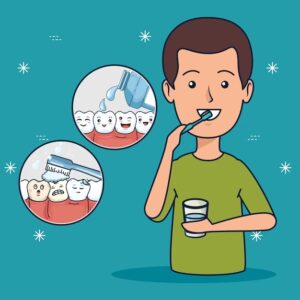You know how crucial it is for maintaining your smile for Clean Mouth if you use a night guard to prevent teeth grinding or a retainer to keep your teeth in place (or even one that does both). You probably already know that maintaining the quality of your night guard or retainer requires learning how to properly clean it.
Cleaning prolong the life of your mouth guard or retainer so it can keep doing its job as well as preventing bacteria and stains.
You’ll be enjoying your spotless retainer or night guard, as well as your mouth, with just a few quick and easy procedures that you can incorporate into your daily routine.
How to naturally Clean Mouth guard
Fortunately, there are a few all-natural ways to clean your mouth guard and keep it hygienic until you use it again.
Soak in water and vinegar

Your mouth guard should be submerged in a solution made up of equal parts water and white vinegar for about an hour for how to clean mouth guard. Any bacteria or plaque that may have accumulated on the surface of the mouth guard are broken down by the acidity of the vinegar.
Use hydrogen peroxide

Your mouth guard should be submerged in a solution made of water and hydrogen peroxide for around 15 minutes. A natural disinfectant that can eliminate stains and kill microorganisms is hydrogen peroxide.
Using baking soda to Clean Mouth

Utilising a toothbrush and a mixture made of baking soda and water, clean the mouth guard’s surface. A natural abrasive that helps get rid of stains and dirt is baking soda.
Implement essential oils

Warm water in a basin with a few drops of tea tree or peppermint oil in it should be used to soak your mouth guard for 15 to 20 minutes. Both oils have inherently antibacterial qualities that can destroy microorganisms and improve the mouth guard’s odour.

There are a few simple daily actions you may take to start cleaning your mouth guard or retainer. These quick and simple daily cleaning procedures can aid in avoiding the formation of those unsightly white spots and yellow stains over time. Your best bet is to avoid stains in the first place since once they have developed, they can be challenging or impossible to remove.
Did You Know? The bacteria that naturally exists in your saliva is what causes the yellow stains that start to appear on your night guard. Similar to this, calcium deposits from your saliva are what produce the white spots that could start appearing on your retainer (more frequently on wire and acrylic Hawley retainers).
Rinse it right away.
Give your night guard or retainer a thorough rinse in cool or lukewarm water as soon as you remove it in the morning. Use of hot water should be avoided as it may cause the fabric to distort.
Utilise a toothbrush to Clean Mouth
After that, gently brush it with a toothbrush with soft bristles. Any remaining saliva or plaque will be helped to get rid of by doing this.
Dry It Off
Allowing your mouth guard or retainer to thoroughly dry before storing it is one of the most crucial things you can take to help avoid bacteria buildup. This is because germs are more prone to flourish in a damp environment.
Use a cloth to blot out the most of the moisture for Clean Mouth, then place the item somewhere dry to air dry entirely before storing it.
Store It Properly
Your night guard or retainer will remain clean and safe if you store it in its case after it has dried. Additionally, it’s a good idea to clean your case sometimes for Clean Mouth. Use dish soap to hand wash your case; however, avoid using the dishwasher as the heat may cause the plastic to melt. As we now know, moisture is bacteria’s best friend, so make sure the container is totally dry.
Regular Deep Cleaning
To make sure your night guard or retainer is operating at its peak, it’s a good idea to deep clean it once a week.
Employ a cleaning tablet
Simply place your night guard or retainer and a cleaning tablet designed for dental equipment in a glass of water, and let them soak for 10 minutes. Most drugstores sell these over-the-counter, but you may also use our specially developed cleaning tablets, which eliminate 99% of the germs that cause odours while also preventing discolouration and stains. The cleaning power of those bubbly bubbles will also leave a clean, minty aroma behind. Rinse in cool water after soaking, then let the item completely dry before storing.
Floss or use hydrogen peroxide
If you don’t have cleaning tablets, use just enough water to a capful of mouthwash to make a solution that will barely cover your night guard or retainer. Give it at least 10 and maybe 30 minutes to soak.
In the absence of Clean Mouth, hydrogen peroxide will also help. Hydrogen peroxide and water combined in equal parts should work.
After another thorough rinse, let it air dry fully before storage.
Pro tip: No matter the method you use for soaking, keep in mind that soaking for more than an hour could potentially harm the material.
Help! My retainer or night guard is stained
As we previously indicated to Clean Mouth, your best choice is always to avoid stains altogether by doing proper cleaning. What can you do, though, if you haven’t been adhering to your cleaning schedule (it happens)?
Your chances of getting rid of the stains may be better or lower depending on the kind you have for Clean Mouth.
Unfortunately, once yellow discolouration has developed, it can be exceedingly challenging to remove. Certain night guard materials age more quickly than others for Clean Mouth. Soft night guards are especially vulnerable since the material is more porous. In that scenario, to stop the discoloration from getting worse, we advise using cleaning tablets more frequently.
Try soaking your retainer in a solution of 1 part white vinegar to 3 parts water for 15 minutes if you’re observing white deposits caused by calcium accumulation. After removing any calcium that may still be present, carefully rinse with cool or warm water.
Conclusion
Your mouth guard or retainer needs maintenance and cleaning just like your teeth do in order to function properly. By including these actions into your routine for Clean Mouth, you can give it the longest potential life while also keeping it clean and fresh.
Do you think your night guard has no chance of recovery? We can create a brand-new, personalised night guard for you at a tenth of the price of a dentist’s. The best part is that you can do it without ever leaving your house. Or perhaps the cost is the finest feature. Let us leave that up to you.



